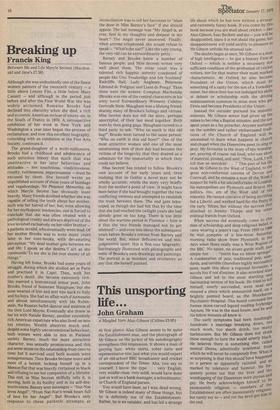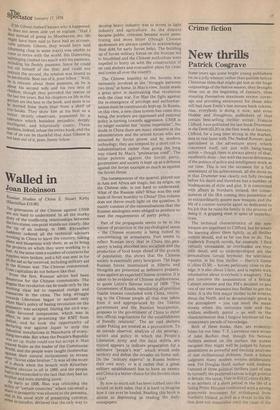Breaking up
Francis King
Between Me and Life Meryle Secrest (Macdonald and Jane's £7.50) Although she was undoubtedly one of the finest women painters of the twentieth century — a little above Lenore Fini, a little below Mary Cassatt — and although in the period just before and after the First World War she was widely acclaimed, Romaine Brooks had declined into obscurity when she died, a rich and eccentric American recluse of ninety-six, in the South of France in 1970. A retrospective exhibition of her work in New York and Washington a year later began the process of reclamation; and now this excellent biography, coinciding with an exhibition at the Fine Arts Society, continues it.
The grand-daughter of a multi-millionaire, Brooks had a childhood and adolescence of such atrocious misery that much that was unattractive in her later behaviour and attitudes — her touchiness, vindictiveness, cruelty, ruthlessness, imperiousness — must be excused by them. She herself wrote an unpublished account of these years of bondage and vagabondage, No Pleasant Memorie, on which Meryle Secrest has obviously leant heavily. Many friends doubted whether she was capable of telling the truth about her mother, such was her hatred of her; but, even allowing for her mythopoeic tendencies, one is forced to conclude that she was often treated with a pathological cruelty and always deprived of the love lavished exclusively on her older brother — a pathetic invalid, who eventually went mad. Of her mother Brooks was to write many years later in her note-books, with devastating perception: "My dead mother gets between me and life. I speak as she desires/I act as she commands/To me she is the root enemy of all things."
Having left home, Brooks had some years of struggle, during which she studied art in Paris and practised it in Capri. Then, with her mother's death, she became extremely rich. She married a homosexual minor poet, John Brooks, friend of Somerset Maugham; but she soon wearied of him and sent him back to Italy and his boys. She had an affair with d'Annunzio and almost simultaneously with Ida Rubinstein, the Russian ballet-dancer and mistress of the then Lord Moyne. Eventually she threw in her lot with Natalie Barney, another extremely rich American expatriate who also lived on into her nineties. Wealth absolves much and, despite some highly unconventional behaviour, both women were able to mix in Parisian society. Barney, much the more attractive character, was sexually promiscuous and this put some strain on the relationship from time to time; but it survived until both women were nonagenarians. Then Brooks became more and more of a hermit, locking herself up in a Menton flat that was heavily curtained in black and refusing to see her companion of a lifetime. This end, as Miss Secrest skilfully tells it, is moving, both in its futility and in its self-destructiveness. Barney sent messages — "Nat-Nat loves Angel", "From Nat-Nat's weak heart full of love for her Angel". But Brooks's only response to these pathetic attempts at reconciliation was to tell her factotum to "slam the door in Miss Barney's face" if she should appear. The last message was "My Angel is, as ever, first in my thoughts and deepest in my heart." The Angel never answered. Finally, when anyone telephoned, she would refuse to speak — "What's the use?" Like the very young, the very old can be extraordinarily petty.
Barney and Brooks knew a number of famous people; and Miss Secrest writes very well about them. The inner court was a talented, rich Sapphic sorority composed of people like Una Troubridge and her 'husband' Radcliffe Hall, Lady Anglesey, Princesse Edmond de Polignac and Liane de Pougy. Then there were the writers: Compton Mackenzie (Brooks was one of the central characters in his witty novel Extraordinary Women); Colette; Gertrude Stein. Maugham was a lifelong friend, sharing many of Brooks's failings and virtues. Miss Secrest does not tell the story, perhaps apocryphal, of their last meal together. Both were by then going gaga. Maugham turned to a third party to ask: "Who on earth is this old bag?" Brooks soon turned to the same person: "Who on earth is this old bore?" One of the most attractive women and one of the most entertaining men of their day had become the victims of the longevity that they desired as a substitute for the immortality in which they could not believe.
Miss Secrest has tended to follow Brooks's own account of her early years and, then realising that so Gothic a novel may not be wholly accurate, retells the story very briefly from the mother's point of view. It might have been better if she had brought together the two conflicting versions and attempted to establish the truth between them. The end gets telescoped, as though she had felt that by the time that she had reached the twilight years she had already gone on too long. There is too little about the wartime period in Florence — how is it that the two friends managed not to get interned? — and even less about the subsequent years before Brooks's retreat from Barney and the world. But, minor deficiencies and misjudgements apart, this is first-rate biography, fascinatingly illustrated with photographs and some of Brooks's own drawings and paintings. The portrait is as mordant and revelatory as any that she herself painted.
Spectator January 17, 1976 life about which he has now written a strange and extremely funny book. If you come by this book because you are mad about cricket — like Alan Gibson, Sam Beckett and me — you will be disappointed, since it is not about the game, but disappointment will yield swiftly to pleasure as Mr Gibson unfolds his unusual tale.
The doubts begin at once. Mr Gibson is a marl of high intelligence — he got a history First at Oxford — which is neither a necessary nor sufficient condition of the profession of cricket writers, nor for that matter their most marked characteristic. At Oxford he also became President of the Union, which must be something of a rarity for the son of a Yorkshire miner, but since then has not indulged his skills at debate or scholarship with the driving ambitiousness common to most men who get Firsts and become Presidents of the Union.
Instead the outsider pursued his minority interests. Mr Gibson senior had given up the mines to become a Baptist minister, and the son spent years as a lay preacher. Anyone nurtured on the sombre and rather embarrassed traditions of the Church of England will be astonished to learn what happens in church and chapel when the Dissenters meet to sing or pray. My favourite is the story of the worshiP. per, praying of course out loud, who ran short of material, paused, and said: "Now, Lord, I will tell thee an anecdote . . ." This part of his life took Mr Gibson to the West of England, to the great non-conformist centres of Devon and Cornwall, and he remains a man of the West. I suspect he feels a bit uncomfortable in London; his metropolises are Plymouth and Bristol. His politics, too, are of the West and of the minority. He cannot conceive of being anything but a Liberal, and worked hard for the Party In the early 'fifties, but without the success that attached to Jeremy Thorpe and his other political friends from Oxford. When success did eventually come to this man of scholarship and deep religious belief, It came wearing a jester's cap. From 1955 to 1966 he was compere of a low-brow Saturda) morning radio show from Plymouth, in the, days when there really was a West Region ot the BBC. No satire, no avant-garde stuff, Jas„t simple fun . . . "mirth has no bitter springs ' A combination of jazz, traditional pop, stall' dards, and terrible (therefore highly successful) puns, made this show a regional favourite, a succes fou if not d'estime. It also wrecked Alan, Gibson and led to the most startling an fascinating section of his book. He tried to ki)! himself, nearly succeeded, went mad an° entered a place which announced itself, on a brightly painted board, as the Moorhaven Psychiatric Hospital. This board concealed. the former stone-carved legend reading ivybridge. Asylum. He was in the mad-house, and he and his fellow inmates all knew it.
The early symptoms had been insultinglY humdrum: a marriage breaking down, tn° much work, too much drink, too manY barbiturates. But Mr Gibson does not think these enough to turn the world utterly black. frecalled He believes there is something else,
mental illness, admittedly irrational, fro mwhich he will never be completely free. What is so surprising is that this should have happened to a person so apparently rational, and so marked by tolerance and humour. He quently points out that the lives and the . worshipping of the Dissenters were joyous an. de gay. He freely acknowledges himself to 11 passionately religious — members of . the Establishment are often passionately religiouisn, the end.erhardely say so — and yet the devil got him h If Mr Gibson himself knows why it happened, he does not seem able yet to explain. "Had I died instead of going to Moorhaven, my life Might have been said to have had an accountable pattern. Gibson, they would have said (charming chap in some ways) was unable to come to terms with the world. His Dissenting uPbringing clashed too much with his passions, including his fleshly passions. Since he could not rid himself of the first, and could not restrain the second, the tension was bound to be intolerable. Best out of it, poor fellow." Well, he is reticent about these passions, as he is about his second wife and his two sets of Children, though they provided the rescue of the last ten years. But his chapters on life in the asylum are the best in the book, and more is to he learned from them than from a shelf of text-books. They show him at his best as a writer; strictly -observant, possessed by a tolerance which banishes prejudice, deeply intelligent, and hilariously comic. These qualities, indeed, infuse the entire book, and the rest of us can be thankful that Alan Gibson is not best out of it, poor, funny fellow.



























 Previous page
Previous page